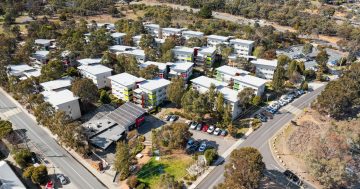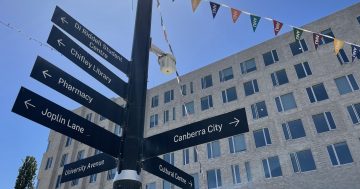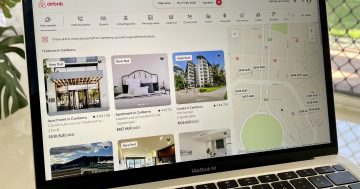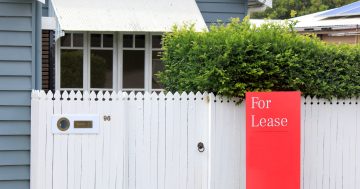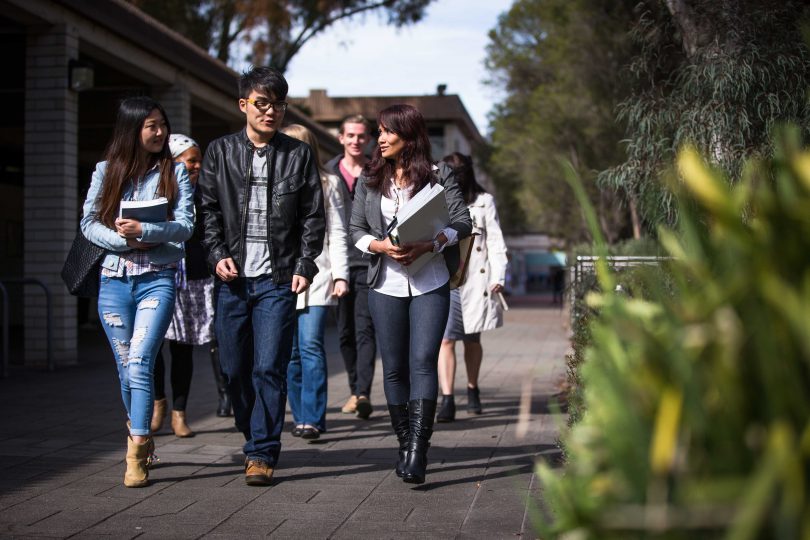
Looking for student accommodation? Photo: University of Canberra.
Each year thousands of university students call Canberra home.
Boasting world-class tertiary institutions, state-of-the-art facilities, and some of Australia’s brightest academic minds, it is easy to see why.
If you are one of the lucky few, you will know just how attractive studying in Canberra can be.
Our vivacious city has established a global reputation as a centre of academic excellence offering hundreds of courses. Our tertiary institutions often rank in the world’s top 100 – with several in Australia’s top 10.
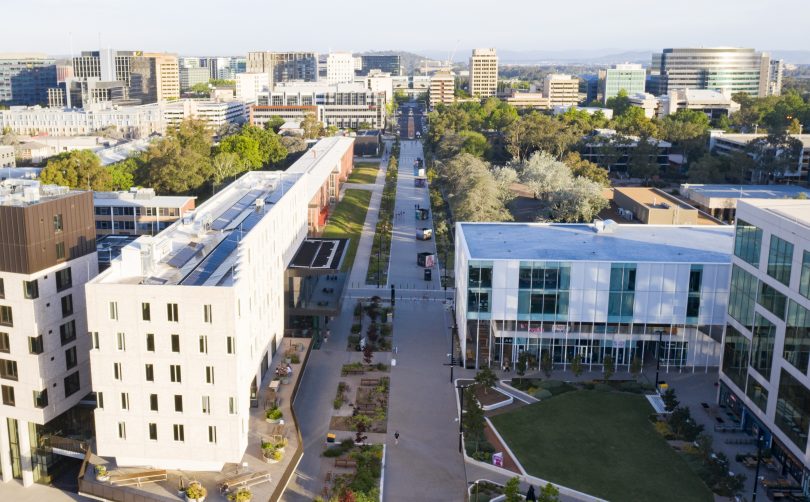
Located in the heart of Canberra, the Australian National University is one of Australia’s top universities. Photo: Martin Ollman.
Students here are surrounded by the cognitive wheels that propel our nation forward. They are taught by award-winning researchers, innovators, and entrepreneurs and they are in the presence of leaders, creatives, change-makers, and Nobel Laureates. It is undeniable – our city values education and a thirst for knowledge deeply.
For students, Canberra has so much to offer. Its glorious natural environment, deep cultural heartbeat, and thriving social scene truly has something for everyone. It holds the same progressive disposition, vibrant attitude, and cultural diversity of any Australian city, but at a gentler pace.
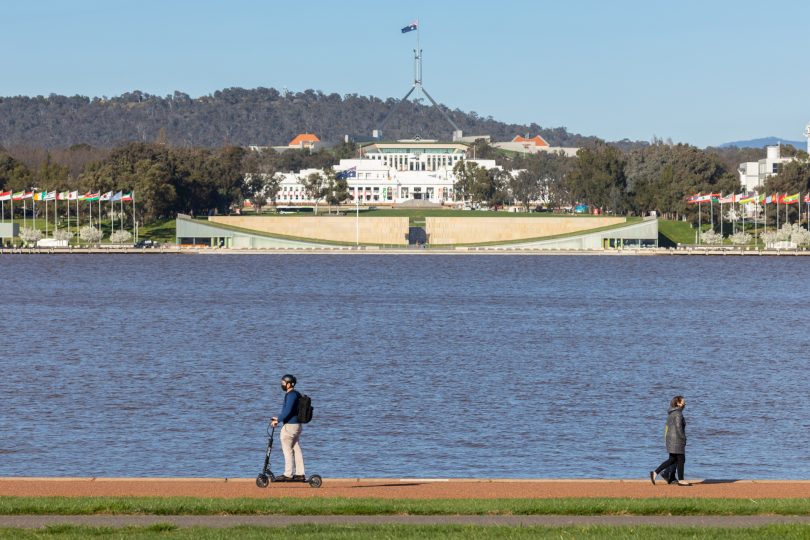
Canberra is one of the most liveable cities in the world. Photo: Michelle Kroll.
Canberra is one of the most liveable cities in the world, affordable and accessible, with residents enjoying exceptional standards of living. Our rewarding employment prospects and high-income potential also makes Canberra an attractive choice for life after university.
As Australia – and the world – begins to reopen, many are seeking or returning to life in Canberra. Be it our beloved international students or large expat community, all will be vying for a place to call home.
As the local property market is potentially as hot as it has ever been, finding the right residence may be challenging. With lower entry costs, attractive tax concessions, and strong growth rates, the local property market is fierce.
While students do have options, everyone – from buyers to sellers, and renters – is feeling the heat. For those considering tertiary studies and accommodation in Canberra, the best advice is to plan, prepare, and proceed swiftly.
Accommodation options for students
From home stays in suburban surrounds through to renting or owning a luxury inner-city apartment, accommodation choices are plentiful. Finding the right place to call home will depend on your individual preferences, needs, and budget. For most students it really comes down to the following choices: university accommodation, homestay, private rental, and owning or investing.
University accommodation
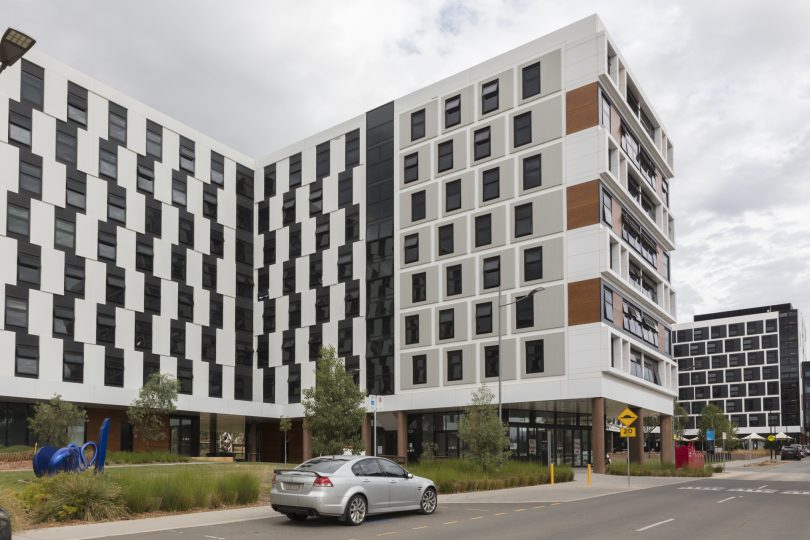
Accommodation through university services for new students can help the transition to university run smoothly, thanks to the furnishings, catering and 24-hour support. Photo: Region Media.
For many, seeking student accommodation via university services is an excellent choice. Whether your preference is to live on or off-campus, alone or shared, catered or not, Canberra’s universities offer numerous options. Equally, university accommodation caters to the needs of families, post-graduate, and mature students alike.
Many universities offer accommodation guarantees, though these do come with conditions. They are typically offered to new students, who express interest in accommodation placement at the time of acceptance. Strict application timelines are typical, with availability also dependent on seasonality.
In addition to campus villages, there are other purpose-built student accommodation providers such as UniLodge. They offer individual or shared apartment options which are often fully furnished, with catering options, and 24-hour support. This kind of accommodation may also offer facilities such as a gym, pool, social and study areas.
Costs
Single rooms in shared apartments or residential halls can range from $250 AUD to upwards of $550 AUD per week. Studio and one-bedroom apartments in purpose-built student lodgings typically start at $500 AUD upwards per week, inclusive of utilities.

Apply for student accommodation through your tertiary institution. Photo: University of Canberra.
How to apply
A great starting point is via consultation with your tertiary institution. The accommodation team may liaise with you directly or refer you to other lodging providers. As terms and conditions vary by university, ensure you understand the end-to-end process including how rooms are prioritised, offered, and placed. Be sure to obtain essential application criteria along with timelines for submission.
Typical university or student accommodation applications will require submission of the following:
- Personal and emergency contact details;
- University enrolment and course details along with any applicable scholarships;
- Personal identification including passport, visa, and licence details;
- Occupation, current employment status and history;
- Proof of income as demonstrated by bank statements, payslips, or tax return;
- Family status and any roommate preferences or requests;
- And a bond and upfront rental payment may be required to secure property.
Own or invest
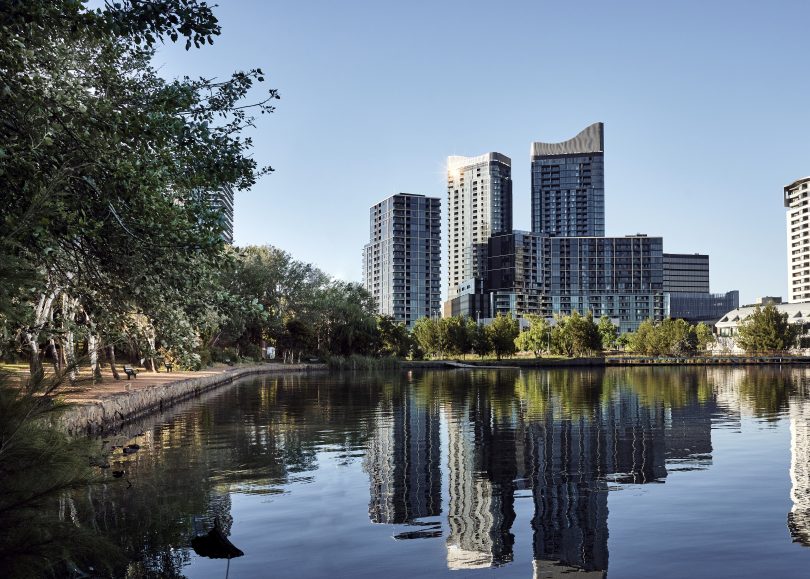
Purchasing a property can be a great option for students; particularly with developments like Republic in Belconnen that has close proximity to University of Canberra. Image: Geocon.
For those who prefer security or are ready to reap the rewards of an investment, purchasing a property is ideal. The booming Canberra market has led the way in terms of capital growth and return versus its interstate counterparts.
Unlike Sydney, Melbourne, or Brisbane, property owners in Canberra benefit from overperformance across numerous key indicators. Canberra offers the strongest annual rental return and median price growth across both house and unit sectors. Lower taxes through stamp duty concessions and the city’s strong economic performance only add to its attractiveness.
Students or student families who are ready purchase locally are spoilt for choice. With a slate of new developments across key lifestyle precincts, properties are ready and waiting. However, there are a few things to consider: the nature of Crown Leasehold land, financing, visa status, and foreign investment regulation all require investigation. For more see our handy FAQ section below.
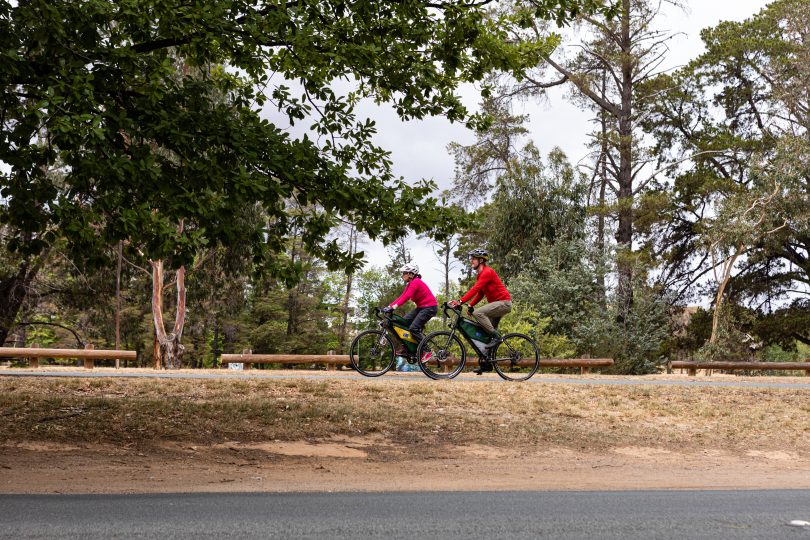
Locals enjoy the bike paths in Turner. Photo: Daniella Jukic.
Costs
A one bedroom, one bathroom, one car space apartment off the plan in a new development can start from $485,000 AUD. Note that this is the purchase price only, excluding any associated fees or taxes. With a 20 percent deposit and calculated at 4.5 percent interest, this could equate to a weekly loan repayment of about $500 AUD per week (principal and interest). Calculations will vary based on rates and terms set out in each loan agreement, however this provides not only a cash flow saving – it also opens the door to an investment in the booming local market. Naturally the cost does scale upwards as apartment sizes and amenities increase, along with its location.
The good news is that at the time of publication several government initiatives have made entering the local property market more attractive. The ACT Government has introduced a range of stamp duty concessions for eligible owner occupiers. This may be particularly advantageous for owner occupier purchases of off-the-plan units under $500,000 AUD. While terms and eligibility criteria do apply, these concessions could save purchasers up to $35,910.
For those seeking to establish life in Canberra post degree, purchasing a local property may also assist with permanent residency as currently, cash investments of $250,000 and upwards in ACT residential property could potentially add five points. Individual circumstances do vary, so it is worth consulting an immigration agent for further details.
How to purchase
A typical property purchase transaction will require the following:
- Personal and emergency contact details;
- Personal identification including passport, visa, and driver’s licence;
- Occupation, current employment status and history;
- Proof of income as demonstrated by bank statements, payslips, or tax return;
- Deposit and confirmation of how property will be financed;
- Financial institution key contact along with pre-approved finance if applicable;
- Professional property services contacts including lawyer, solicitor, and conveyancer;
- Guarantor details if applicable;
- And Foreign investment review board approval if applicable.
With the competitive Canberra market in mind, students and their families may obtain an edge contacting full-service developers like Geocon directly. As one of the region’s premier developers, they have a host of newly built residential apartments across the region’s key precincts.
Offering end-to-end luxury and amenities aplenty, developments like Metropol and Nightfall have all a student could need – and more. To find out more contact Rhea Wang on 0436 481 447 or marketing@geocon.com.au.
Private rental

For a more independent lifestyle, private rentals may be a great choice. Photo: Geocon.
For those who prefer independent living and greater choice, private rental is an excellent alternative. Private rental properties – be it apartments, townhouses, or homes – are rented from a private landlord or real estate agent. Students can rent a property on their own or shared with others, and in the location of their choosing.
Private rental typically allows a choice of furnished or unfurnished properties and may include shared facilities such as pools and gyms.
Perhaps the greatest advantages of this option are the privacy and space provided. In contrast to student accommodation, private rentals give students the option of socialising as little – or as much – as they like. They also tend to provide greater square meterage for all the creature comforts of home. For those who prefer to drive, many private rentals come equipped with an allocated car space.
Costs
A one bedroom, one bathroom, and single car space centrally located apartment typically rents from $450 AUD per week upwards. For those who desire more space, two bedroom, two bedroom and single car space apartments generally start at $600 AUD per week. Note these costs typically cover rent only, excluding utilities, insurance, and meals.
How to apply
As the name implies, private rentals are usually managed by landlords or real estate agents directly. Due to high demand vacancy rates often sit below one percent, with numerous applicants contending for a single property. Students who prefer this option are advised to commence research early, narrowing down desired locations and agents respectively.
A typical private rental application will require submission of the following:
- Personal and emergency contact details;
- Personal identification including passport, visa, and driver’s licence;
- Occupation, current employment status and history;
- Proof of income as demonstrated by bank statements, payslips, or tax return;
- Rental history summary in the form of a rental ledger;
- Minimum of two phone and written references ie employer, accountant, property manager;
- Guarantor details when the rent amount is greater than 30 percent of a tenant’s personal income;
- Pet reference if applicable;
- And, bond and upfront rental payment is generally required to secure the property.
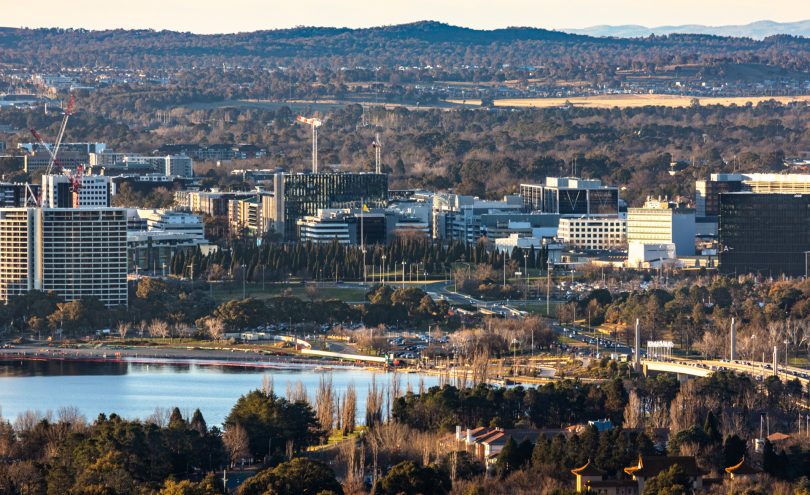
Canberra’s city skyline. Photo: Michelle Kroll.
Many excellent options exist across Canberra’s cosmopolitan epicentres, close to all essential amenities and of course the campuses themselves. While local property websites like zango.com.au are a great starting point; engaging a property management team can help expedite the process.
Full-service agents like apartment specialists The Property Collective, are particularly advantageous for students. They work in collaboration with a network of service providers to assist tenants at every stage of the renting experience. From support with moving to peace of mind servicing, they offer comfort knowing that needs will be catered for. To find out more contact Kyle Buggy on 0457 589 354 or leasing@thepropertycollective.com.au.
A note for first-time renters
A rental application component that many students typically struggle with is the provision of a reference. As first-time renters most students do not have any rental history, let alone a relationship with a prior landlord or property manager.
The role of a reference letter is to formally document and vouch for an applicant’s ability to meet financial commitments. It also reinforces an applicant’s ability as caretaker of a property. The good news is that all of this can demonstrated, even by those who have never rented before.
How? By finding other ways to prove you are a responsible and tidy student with a history of paying bills on time.
- This could mean contacting your employer to outline your personal demeanour and of course validate your regular income.
- It could also mean providing mobile phone bills or car loan repayments to demonstrate your financial accountability.
- For those who have resided in student accommodation, a reference from the manager or homestay contact could help.
- Add to this character references from teachers, your accountant – or even your doctor.
- For references supplied in another language, consider the use of a professional interpreter.
Homestay

Homestay can give students a deep cultural experience. Photo: File.
For students seeking a deep cultural experience, homestay is a great option. A popular form of accommodation for international students, homestay facilitates lodging with a local host or host family. The host typically provides accommodation and support over an agreed timeframe and fee.
Support can include meals, assistance with transport, and other activities. This alternative is well-suited to those who desire an authentic lifestyle experience and an opportunity to embrace the local language. It is also a nice entry point for new students before considering more independently led accommodation.
Costs
A homestay room with a host generally starts from approximately $250 AUD per week without meals, to upwards of $350 AUD per week with meals. This usually includes utilities, however additional fees may apply.
How to apply
Many universities will have a dedicated Homestay Coordinator and they are a great starting point for discussion. They may work directly with homestay hosts or refer you to local homestay network partners such as The Australian Homestay Network.
Most homestay applications will require a submission of following:
- Personal and emergency contact details;
- University enrolment and course details along with any applicable scholarships;
- Personal identification including passport, visa, and driver’s licence;
- Occupation, current employment status and history;
- Proof of income as demonstrated by bank statements, payslips, or tax return;
- Flight information for arrival and/or departure;
- And, a bond and upfront rental payment may be required to secure the property.
Important accommodation essentials
Here are our tips to help you plan, prepare, and procure your student accommodation swiftly:
- Start researching as soon as you receive an acceptance letter from your tertiary institution.
- Consider your accommodation preferences and prioritise what is most important to you.
- Research the local property market with respect to your options.
- Know your rights and responsibilities under each accommodation scenario.
- Inspect any property prior to signing, entrust a entrust a relative or friend to assist if you are unable to attend.
- Understand fixed and variable costs, along with what is included and what is not.
- Be clear with all contracts along with timelines, terms, and conditions.
- Seek professional advice – speak to your university, accountant, lawyer, real estate agent, and financial institution.
Considerations for arriving students
Finding the perfect student abode is as much about location as it is the property itself. Before tackling your choices, consider how you plan on getting from point A to point B. Proximity to campus will be key, as will access to services, transport, and the many lifestyle aspects Canberra has to offer.

This group said they go to Deakin for a coffee at Double Shot. Photo: Daniella Jukic.
Local districts
- Central Canberra. Known by the locals as Civic; Canberra City is the metropolitan epicentre of the ACT. Full to the brim with shopping, restaurants, public facilities, and transport, many students favour this style of inner-city living. See our surrounding suburb guides on Dickson, Lyneham, Downer, Deakin, and Kingston.
- Woden. The geographical heart of Canberra, Woden presents every possible convenience at your doorstep. A mere 10 minutes away from Canberra City with its own commercial town centre, it is an excellent choice for students. See our suburb guides on Chifley, Garran, Pearce, Mawson, and Phillip for more.
- Belconnen. Designed as one of Canberra’s satellite centres and nearby location to universities, Belconnen is an excellent choice. With many outdoor recreational spaces and shopping a plenty, this district contains all that a student would need. To explore more, see our suburb guides on Bruce, Fraser, Kaleen, and Macgregor.
- Weston Creek. As one of the region’s smaller districts, Weston Creek offers suburban appeal with its own major shopping complex and easy access to core carriageways. Favoured by students for its range of accommodation options you can find out more about suburbs like Fisher here.
- Tuggeranong. Nestled in Canberra’s south, Tuggeranong offers great accommodation options for students who are happy to travel. With a grand lake and plenty of greenery, explore the suburbs of Greenway and Wanniassa to find out more.
- Gungahlin. As one of the region’s northern districts, Gungahlin is desired by students for its blend of retail and commercial precincts. Investigate further with our suburb guides on Moncrieff, Franklin, and Bonner.
- Molonglo Valley. As Canberra’s newest district, Molonglo Valley is a quick 15-minute drive to Canberra City. Offering the perfect blend of nature and being close to everything, it is a great option for students. For those seeking a new property, look at suburbs like Wright, Coombs, and Denman Prospect.
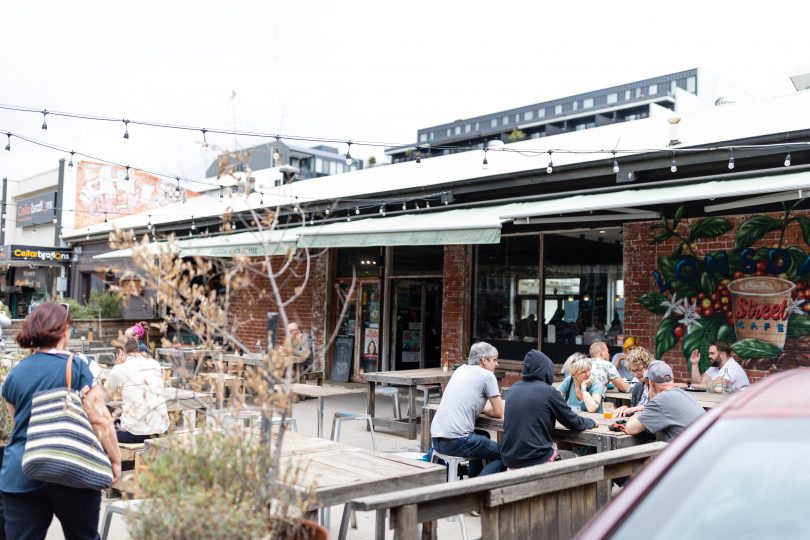
Lonsdale St Roasters in Braddon. Photo: Daniella Jukic.
Getting around
- Public transport. Unlike most cities around Australia, Canberra benefits from a well-planned road network and public transport system. For students, getting around the ACT has never been easier with both busses and light rail networks readily available. Moreover, several fare concessions are available for full time students making the public transport system even more accessible.
- Taxis. For times when a direct service is more convenient, Canberra also offers traditional taxicab services. Hailed from the street; at one of our many taxi ranks; or booked directly; they are a great alternative. Services include ACT Cabs, QBN Cabs, Silver Service, and All Green Cabs.
- Rideshare. Should you wish to organise transport at a time of your choosing, Canberra’s many rideshare vendors are ready and waiting. Most work in tandem with an app and are as easy as they are convenient. Some local operators in Uber, Ola, Didi and all-women service Shebah.
- Private vehicle. For those who prefer to travel independently, owning a private vehicle is an excellent option. With affordable parking, convenient fuel and EV charging stations, and great roads, driving in Canberra is a breeze. Students may elect to purchase new or used car, or potentially rent one long term. For interstate or international drivers who wish to drive locally, see Access Canberra for details on how. And for those who wish to learn to drive in Canberra our guide on the best driving schools may help.
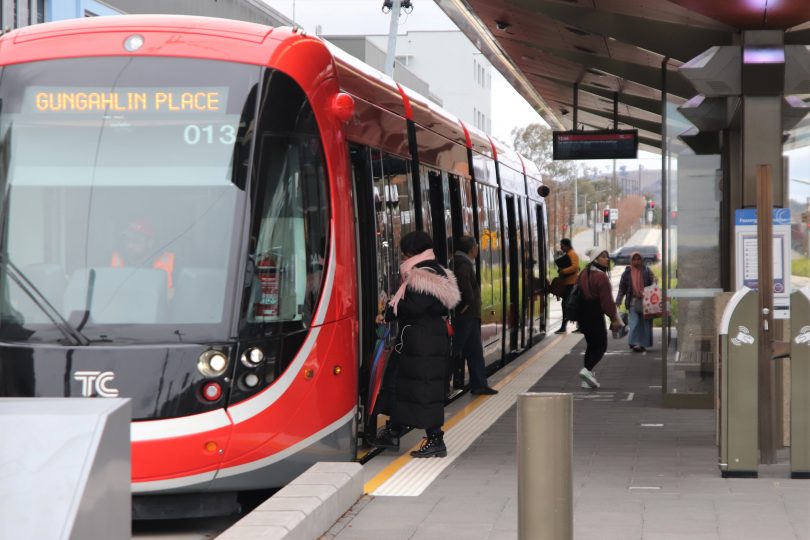
Canberra’s light rail can make for an easy commute around the city. Photo: Damien Larkins.
Find out more
There is a lot to arrange when moving to study in a new city. Our content on the latest property developments, the best property developers, the best property managers, and the best real estate agents may be helpful. For those looking for someone to live with or a room in a share house, visit flatmates.com or Gumtree.
Frequently Asked Questions
What is a tenancy agreement?
A tenancy agreement, otherwise known as a lease agreement, is a legally binding document between a tenant and landlord which outlines the conditions upon which a property is rented. It typically contains the names and addresses of tenants, owners, and presiding real estate agency; the start and end dates of the agreement; bond and rental amounts, along with the frequency of rental payments and how each should be made. Most new tenancy agreements are set to a fixed term, often 12 months, however this can at times be negotiated.
What upfront costs are associated with renting a property in Canberra?
Typical upfront costs for renting a property in Canberra can include a rental bond, initial rent payment, contents insurance, and associated connection fees for utilities such as electricity and services like internet. A rental bond is essentially a one-off security deposit designed to protect owners from property damage by tenants. It is paid at the start of any tenancy and generally equates to 4 weeks rent. All bonds are held by the Office of Rental Bonds, where they remain until disbursement on conclusion of the tenancy. The initial rent payment is effectively rent paid in advance, most commonly equivalent to week’s rent. Both the rental bond and initial rent payment are usually managed by the leasing agents. Additional costs include insurance for any contents, along with connection fees for utilities and services which are to be organised directly with providers.
What is Crown Leasehold land and how does it apply to a property purchase in Canberra?
Property within the ACT is owned, leased, and managed by the Commonwealth under what is known as Crown Leasehold land. All residential land effectively operates under a long-term lease, typically granted for a period of 99 years. This means that when you buy – or sell – property in Canberra, you are effectively buying or selling the remaining period of the Crown lease. The good news is that renewal is generally a straightforward process requiring some administration and a fee. When a Crown lease is legally transferred or granted, anyone who buys an apartment, house, or block of land becomes the registered proprietor. It’s important to note that you may not be able to borrow money from a bank or other financial institution until this transfer process is complete. Similarly, for new land, building can only commence after the Crown Lease is granted or transferred and development application approved. For further information visit https://www.planning.act.gov.au/leasing-and-titles/crown-leases.
What is FIRB?
FIRB is an acronym for the Foreign Investment Review Board, is an Australian government body that assesses applications from foreigners who wish to purchase property in Australia. For FIRB purposes, a ‘foreign person’ is generally defined as an individual not ordinarily resident in Australia. To find out more about FIRB visit https://firb.gov.au/.
When may I need FIRB approval?
Generally, both temporary residents and foreign investors require FIRB approval before purchasing property in Canberra, however there are some conditions. Temporary residents, or those on temporary visas (i.e., spouse, 457, temporary skill shortage or student visa) can buy one established dwelling to live in, however are required to sell once it is no longer resided in. Temporary residents can also purchase an investment property; however, it must be a new property or vacant land to build a new property. Unlike temporary residents, foreign investors are not eligible to purchase an established dwelling. An investment property purchase must be for new property or vacant land to build a new property. However foreign investors may purchase a property in their name and rent it to a child on a temporary visa. In some instances, exemptions may apply for both temporary residents and foreign investors, so do seek professional advice. For more information visit https://firb.gov.au/.












